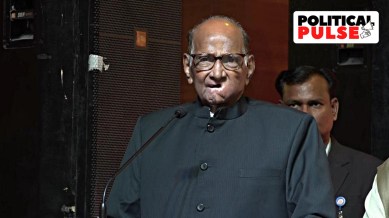Vikas Pathak is deputy associate editor with The Indian Express and writes on national politics. He has over 17 years of experience, and has worked earlier with The Hindustan Times and The Hindu, among other publications. He has covered the national BJP, some key central ministries and Parliament for years, and has covered the 2009 and 2019 Lok Sabha polls and many state assembly polls. He has interviewed many Union ministers and Chief Ministers. Vikas has taught as a full-time faculty member at Asian College of Journalism, Chennai; Symbiosis International University, Pune; Jio Institute, Navi Mumbai; and as a guest professor at Indian Institute of Mass Communication, New Delhi. Vikas has authored a book, Contesting Nationalisms: Hinduism, Secularism and Untouchability in Colonial Punjab (Primus, 2018), which has been widely reviewed by top academic journals and leading newspapers. He did his PhD, M Phil and MA from JNU, New Delhi, was Student of the Year (2005-06) at ACJ and gold medalist from University Rajasthan College in Jaipur in graduation. He has been invited to top academic institutions like JNU, St Stephen’s College, Delhi, and IIT Delhi as a guest speaker/panellist. ... Read More
Pawar of one: As NCP leader takes credit for bringing down Vajpayee government in 1999, what actually transpired
The government lost by one vote, with 269 voting for it and 270 against it, among them then National Conference MP Saifuddin Soz.

Nationalist Congress Party (NCP) founder Sharad Pawar created a flutter recently when he said he was instrumental in the fall of the Atal Bihari Vajpayee government in 1999 when the former Prime Minister lost a no-confidence motion by one vote.
Not taking names, Pawar said during a 10-minute break before voting he went out and talked to an MP who was part of the BJP-led National Democratic Alliance (NDA), convincing him to vote against the government.
monthly limit of free stories.
with an Express account.
The trouble had begun for the Vajpayee government, which lasted only 13 months, when ally AIADMK, led by Jayalalithaa, started creating problems for it. As per Vinay Sitapathi’s book Jugalbandi, Janata Party’s Subramanian Swamy met Congress president Sonia Gandhi to apprise her of the strains in the government and convince her that an alternative government was possible.
At a tea party organised by Swamy, Sonia and Jayalalithaa who were known to dislike each other met and spoke for a brief, sending signals that the ground may be slipping beneath Vajpayee’s feet.
Jayalalithaa then announced soon that her 18 MPs were withdrawing from the Vajpayee government, which had a wafer-thin majority. In the 1998 elections, the BJP had won 181 seats, the Congress 141, the CPI(M) 32, the Samajwadi Party 20, the AIADMK 18, the Rashtriya Janata Dal 17, the Samata Party 12 seats, the CPI nine, the Akali Dal eight, the Janata Dal six, and the Bahujan Samaj Party (BSP) five.
The vote of no-confidence was fixed for April 17, 1999. Vajpayee had not lost hope that morning. For, the DMK, AIADMK’s arch-rival in Tamil Nadu, announced support to the government. BSP leader Kanshi Ram also called up the Prime Minister, promising that the BSP’s five MPs would abstain, bringing down the majority mark. There was a sense that Vajpayee would scrape through narrowly.
But there were last-minute changes to what was seen as a day of relief for the PM. After Vajpayee delivered what came to be regarded as one of his finest speeches in Parliament — he was so combative that Sonia Gandhi got irked and walked up to him, with L K Advani stepping in between her and the PM — the division of votes was scheduled.
How the script flipped
The script changed dramatically at the last moment. The first surprise was the newly elected Odisha Chief Minister Giridhar Gomang of the Congress who had not yet resigned from his Lok Sabha membership from Koraput. Gomang came to the House at the last moment to cast his vote, upsetting the government’s calculations.
There was more in store. As the votes were being counted, it emerged that the BSP had reneged on its promise, choosing to vote against the government. The third, and perhaps the decisive, bombshell came from the NDA. Saifuddin Soz of the National Conference (NC), at the time a constituent of the ruling alliance, voted against his party’s instructions. He was subsequently expelled from the party but his vote played a role in bringing down the government.
The Vajpayee government lost by one vote, with 269 voting for it and 270 against it. The PM looked at the figures in silent disbelief, saying nothing. Yet, as no alternative government could be formed, elections were held again and Vajpayee returned to power with a bigger majority. The BJP remained at 282 but the NDA reached 303, about 30 seats ahead of the majority mark, and Vajpayee ran the first BJP-led government for a full five-year term.